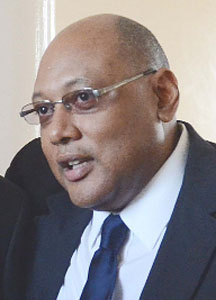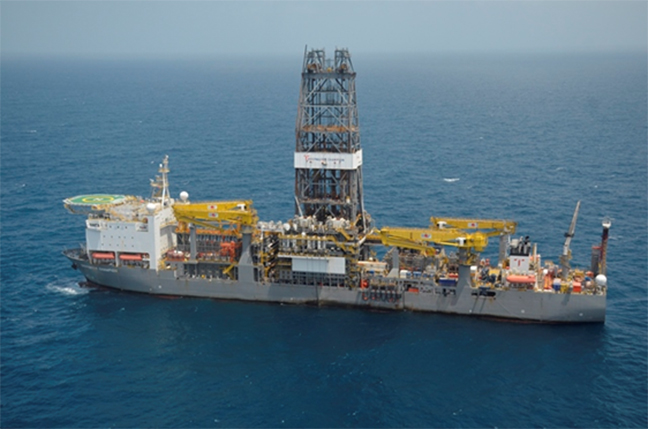The recent petroleum find by US firm ExxonMobil could be as much as 1.5 billion barrels of oil, according to Minister of Governance Raphael Trotman who says that government would press the company to bring the well into production within five years.
“It is our understanding that…the Liza well, a substantial quantity of hydrocarbons has been discovered,” Trotman told Stabroek News in an interview yesterday. “We don’t have right now, an exact quantity, but I believe that you’re looking at something between 800 million to 1.5 billion barrels in that well,” he said. In May, ExxonMobil reported a “significant oil discovery” at its Liza-1 well offshore Guyana, and Trotman said that it has been explained to him that in the oil industry, the word significant is a euphemism for saying that the find is large or mammoth.

Trotman, who has been delegated with oversight duties of Guyana’s natural resources by President David Granger, noted that the President of ExxonMobil was due to visit Guyana two weeks ago but cancelled due to urgent matters and a Senior Vice-President of the company was due to meet President Granger yesterday. He said the fact that the two senior officials chose to visit Guyana is significant. “It’s an indicator of the size of the find that they’ve seen Guyana or the wells here as being extremely rich in potential,” he said.
In a 2000 report, the United States Geological Survey (USGS) identified the Guyana Suriname basin as having the second highest resource potential among unexplored oil basins in the world and said that estimates indicate recoverable oil reserves of 15 billion barrels of oil and gas reserves of 42 trillion cubic feet. Pressed on the source for his figure for the Liza-1 well potential, Trotman said that the figure is what is “anticipated or expected” and in keeping with the USGS surveys, given the Guyana Geology and Mines Commission’s (GGMC) knowledge of the industry as well as the company’s expectations, they believe that the figure is what could be.
He added that once oil has been struck, it means that the contiguous areas will also come under scrutiny to see whether this repeats itself and the indicators are that there is oil in extremely large quantities in that area.
The ExxonMobil rig, the Deepwater Champion has departed and the company has been granted permission to carry out more seismic surveys in the areas within its block near to that well which will take place over the next few months. Noting the cost of operating a rig in deep water, Trotman said that they want to make sure that when there is drilling, it is targeted drilling. “We know there is oil, they just want to know that there is…precision in the methods used to identify and drill the next wells,” he said.
The minister also said that government is looking to have an outside date of five years and a minimum of three years to bring the well to production. “I don’t think it will be immediate but certainly as a government, we will be pressing them for the earliest possible date so I’ve given five years as an outside and about three as an earlier date but we’ll be pressing because it’s in our interest to get them to start up as fast as possible,” he asserted.
“… But long before that happens, you start to see signs of investment and so forth because to have a well out there or more than one well, it’s a 24-hour operation, it will require being able to house a workforce of several hundred. The logistical support for a well [would include] … a landing area in Guyana, harbour facilities, housing,” he said.
The minister acknowledged that deep water drilling is complex and staff, port facilities and markets would have to be in place while production would also have to fall into Exxon’s plans for development of its resources because it has oil reserves worldwide.
Venezuela
Meantime, the issue of Venezuela’s claims of Guyana’s maritime territory would be raised when the Heads of Government of the Caribbean Community (Caricom) meet in Barbados tomorrow.
On May 26, Venezuela’s President Nicholas Maduro issued a Decree purporting to annex maritime zones belonging to Guyana. The Decree was gazetted in Venezuela on May 27. Georgetown has said that the Decree of May 26 was a “baseless and shameless” bid to usurp Guyana’s territory and a “flagrant violation” of international law. Minister of Foreign Affairs Carl Greenidge told Parliament that a definitive solution must be found and signalled that the government would be moving for a juridical settlement of the border controversy.
Questions have been raised over the motives behind the decree and observers pointed out that it came just after ExxonMobil announced what could be the first major oil find in Guyana’s waters. Maps issued by Caracas show the ExxonMobil well site within the zone now being claimed.
Trotman said Guyana expects strong support from Caricom. “At the Caricom level we expect to have a very strong declaration made….reaffirming support for Guyana,” he said while adding that it is very good that the Secretary-Generals of the United Nations and the Commonwealth will be present in Barbados to hear firsthand from the President and Minister of Foreign Affairs about the issue.
He acknowledged that some Caricom countries are members of the Caracas-led ALBA or the PetroCaribe initiative but asserted that blood is thicker than water. “And we have not just been a member of Caricom, we’ve been a leading member of Caricom and we believe that it will count for something and despite the carrots and the goodies that are dangled… We as a member ourselves never had any difficulty in accepting the PetroCaribe concessionary terms, but…that should not prevent other Caricom states from standing with us,” he said.
“It would be quite shocking for us to receive less than full and committed support from them on this matter because it also has implications for the rest of the Caribbean,” Trotman declared. He cited Antigua and Suriname and said that “it would not be in the interest of any other Caricom state to give even a lukewarm response or support to Guyana’s claim or to abstain. That would be taking it to another extreme because, as we say in Guyana, it may start with an inch and it could lead to a mile.
“This matter has implications, longer term, for their own national security and economic security of those other states so it is better for them, quite apart from Guyana being a Caricom country, to stand with Guyana because if and when Venezuela attempts to extend its reach as far away as Antigua all of them will now be affected,” he declared.
The minister further said that normal, civilized states settle their matters through the known mechanisms and processes such as the international court. He noted that the international community has spoken and has been speaking to Venezuela over a number of years about its posturing and attitude.
“Venezuela knows that if it wants to be considered as a member of a regularly organized international society of nations that it can’t just come out with guns blazing or gun slinging to either threaten or to use them,” Trotman asserted. He said Guyana is not going to sit idly by and allow itself to be threatened or bullied. He recalled that in the past, a lot of aid and investment was lost because of Venezuela’s scare tactics but the world has changed and Guyana will mount a very strong diplomatic offensive.
“We’re comfortable with our diplomatic response, we’re comfortable that despite all of the antics of Venezuela that Venezuela is not unmindful of its international obligation and the fact that the international community will not countenance the use of force in this hemisphere by one State against another,” he asserted.
Meantime, several oil exploration companies have indicated their continued interest in drilling in Guyana but Trotman does not expect that there will be any major drilling activity for the remainder of this year.
He said that Repsol is looking at data to determine where to drill next. The company had previously drilled a well but did not find oil in commercial quantities and has asked for an extension to put some things in place. “Their next drilling should be next year,” Trotman said.
Representatives of Anadarko Petroleum Corporation which was at the centre of a diplomatic dispute between Guyana and Venezuela after an exploration vessel operating on its behalf was seized in Guyana’s waters by the Venezuelan navy in 2013, are expected to be in Guyana next week for talks.
CGX Energy has received an extension of time within which to drill. “They were to have done some drilling in October but given Exxon’s find they’ve asked for more time to be able to go back and to actually see if they can get some knowledge sharing done with Exxon to pinpoint again their next drilling site,” Trotman said. He said that the oil firm Tullow has put in an application to drill and company representatives were here recently and were anxious to proceed but the authorities are waiting on a report from experts on how to proceed.
Trotman said that he is also hoping to engage the Brazilian embassy because there was interest shown by some Brazilian companies in the past and he would like to see if they can be re-engaged.
In terms of Guyana’s participation in the Extractive Industries Transparency Initiative (EITI), a global standard aimed at improving revenue transparency and accountability in the extractive sectors, Trotman said Guyana is moving to get fully on board and he has met with the United Nations Development Programme (UNDP) and the US Energy Department for guidance. He said Guyana has not started the formal process as yet but has indicated to EITI, its intent to join the anti-corruption initiative. It is an imperative that Guyana joins, he said.
In terms of a sovereign wealth fund, Trotman disclosed that government has received offers of support from the UNDP, the Canadian government and Norway. “At present…we’re looking more at the Canadian support because through the University of Calgary, they’ve offered to help us to craft or design one that is in our best interest rather than just saying this is how you do it,” he said. The minister related that the Canadian proposal seems to be the one that is more advanced and detailed so government is looking to see how, within the next three months, it could be engaged. The Canadians have offered to come and hold a workshop here, he said.
Trotman asserted that the overarching concept is how to manage the national patrimony not just for current generations but for future generations. Among other things that would need to be done, according to the minister, is to stimulate growth in the population “because the truth is we can’t reap or get the economics of scale for our development if we remain” with the same or declining population. He said that among the suggestions is an active migration programme to bring in skilled labour. The fund has to take a long-term view of what Guyana has and how it is going to be managed and sustained, he said.









